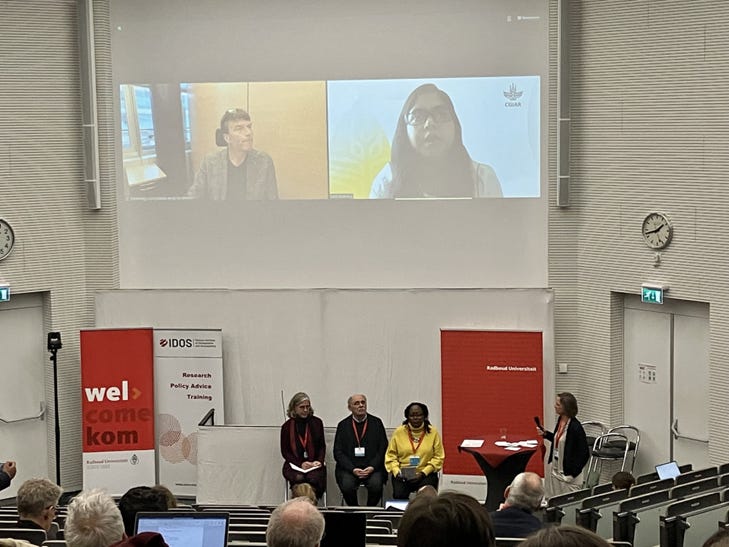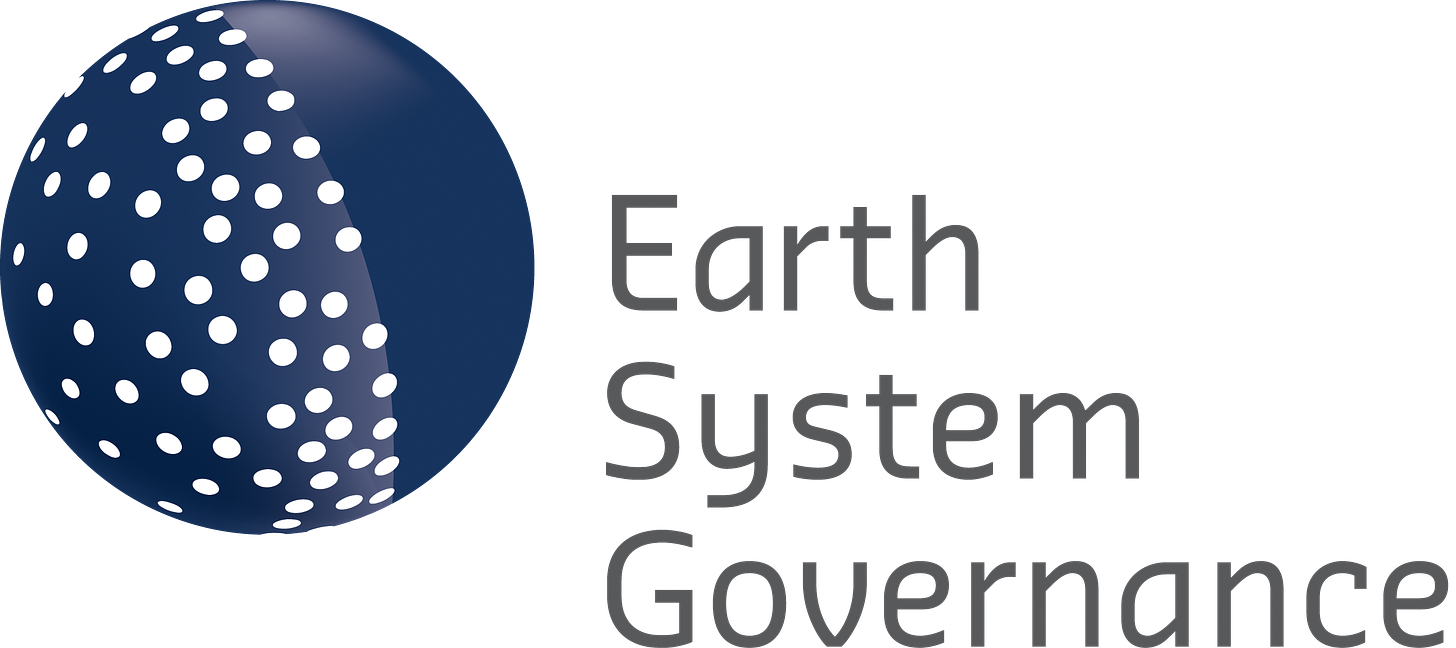A watershed moment for global water governance (Earth System Governance Student Blog)
What are the challenges ahead for governing the complex, cross border and conflicting global good of water ?
Author Bio: Matilda Eve Dun is a PhD student at the Centre for Environmental Policy, Imperial College London, UK. Her research focuses on the topic of mainstreaming biodiversity within the United Nations System, focussing on the barriers and opportunities to better integration of biodiversity aims into the UN’s system-wide programmes. Twitter: @MatildaDunn_.

Water is depended upon for daily survival and deemed a fundamental human right, yet access to this critical resource is still unequal across the globe.
During the 2023 Radboud Conference on Earth System Governance, I attended Tuesday’s semi-plenary session “Bridging the gap: science-policy dialogue on water as a catalyst for sustainable development and climate actions”, chaired by Dr Annabelle Houdret of the German Institute of Development and Sustainability. The roundtable discussion was organised in response to the United Nations (UN) 2023 Water Conference, held in New York in March this year. This conference was hailed as a watershed moment for global water access with approximately 700 voluntary commitments and pledges made from multiple stakeholder groups and a renewed political momentum behind advancing access to safe water and sanitation. But, as we are all too well aware, global environmental commitments no matter how ambitious or well supported, run the risk falling short.
The panel of esteemed experts took a deep dive into the learnings from this UN’s Water Conference as well as the current challenges and opportunities for improved global water governance.
Obstructions to the flow of governance
A key theme of these discussions centred upon the fragmentation of current water governance systems. Professor Robert Varady, University of Arizona, waded through the complexities that exist in this system which consist of a mosaic of institutes, organisations and networks. Likening the governance system to “an ecosystem with different niches”, Professor Varady highlighted that the implications of this type of governance can obstruct the flow of resources, such as adequate financing, and can block on the ground action. A lack of communication and coordination across stakeholder groups also runs the risk of increasing competition for water between different sectors, leading to increased conflicts, escalations of water crises and emerencies across the globe.
These complexities further increase when we consider the fact that 153 states share water across borders. Dr Ines Dombrowsky, German Institute of Development and Sustainability, highlighted that there is currently no general theory of transboundary water governance despite the need to take in to account the upstream and downstream effects. Take the River Nile, whose drainage basin covers 11 different countries supporting these nations’ water access, economies, agricultural practices, fisheries and transport sectors (the list goes on). Despite the transboundary dependence on this single great river, cooperative agreements across countries have been difficult to reach and become the source of many disputes. Most recently, there have been increasing tensions between Egypt, Sudan and Ethiopia over the proposed Grand Ethiopian Reneissance Dam on the Blue Nile which threatens the flow of downstream waters. Without a legal framework to protect cross-border water security, these conflicts will continue to arise and even escalate.
However, our understanding of water governance systems and approaches remains shallow. Professor Varady proposed that the next frontier for water governance research must tackle hydro-diplomacy, identifying the best practice for cross-boundary decision making. But Aditi Mukherji, International Water Management Institute, argued that this will be difficult while a lack of coordination still exists within the water science community itself. She remarked on her own experiences as an expert in groundwater (the water found underground) and working in silos despite integral links with other research fields such as service water (treated water used for specific purposes).
If you have studied any area of global environmental governance previously, these challenges will sound all too familiar. Indeed, the themes of fragmented governance mirrored the barriers I have come across in my own research into mainstreaming biodiversity across the UN’s Systems, posing the question of whether these issues reflect a more fundamental systemic problem with the ways we govern natural resources and ultimately our relationship with nature?
Remaining buoyant
Despite the challenges discussed, panellists were intent to remain optimistic. Water governance can be used as an important entry point for approaching the myriad of global priorities we face today. Yunia Musazzi, Executive Director of Uganda Water and Sanitation NGO emphasised that water is linked to a sea of interconnected issues and is important for ensuring peace as well as promoting health, food security, ensure women go to school and tackling poverty. Calling attention to the underpinning nature of water for achieving the UN’s 2030 Sustainable Development Agenda (SDGs).
According to Johannes Cullmann, UN Water Vice Chair, the next steps from the UN conference will be to develop a coherent strategy for transformation which will build on mainstreaming of water into different agendas. While Nation states made many commitments at the UN conference, these are non-binding and present an important role for citizen action in ensuring the leaders are held accountable to these commitments. This point reflected the motivational plenary presented by Marjan Minnesma, Urgenda, who spoke of the ripples that citizens can make when they hold their leaders to account. The mention of civilian action reminded me of the activist in the UK who are fighting for cleaner rivers after a recent statistic revealed that just 14% of English rivers can be classed as “healthy” due to illegal waste discharges by private water companies (Environment Agency, 2022). The shocking finding has lead to a wave of grassroots activism and many communities taking matters into their own hands leading to inspiring results such as shifts in local governments, legal action and even changing the status designated to particular water bodies to ensure better protection.
Turning the tide for water governance
Dr Houdret summarised the thought provoking discussions of the semi-plenary session in three words “harmony, accountability and community”.
I had been struck by the sincere and self-reflective comments from Aditi Mukherji about the need for better coordination within the scientific community and wondered how we as researchers can better work together across disciplinary boundaries to apply these principles to our own practices?
Walking away from the plenary, I reflected on the collective action and shared responsibility we all have in shaping the future of water governance. Personally, the session inspired me to re-think my approach to my own research by better understanding the harmonies between water security and biodiversity safeguarding. And, while researching for this blog, I joined a local community action group campaigning for healthy UK rivers. These actions certainly won’t turn the tide for global water governance, but as they say, every wave starts with a drop in the ocean.
About the Earth System Governance Project
The Earth System Governance Project is a global, interdisciplinary research network advancing knowledge at the interface between global environmental change and governance. The project aims to explore political solutions and novel, more effective governance systems to cope with global environmental change. You can connect with this network by becoming a research fellow, joining a taskforce or working group, or publishing with one of our publication outlets.



